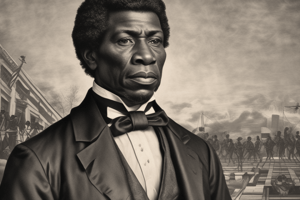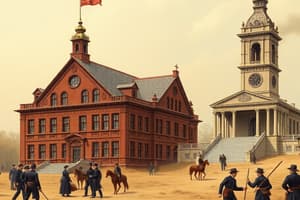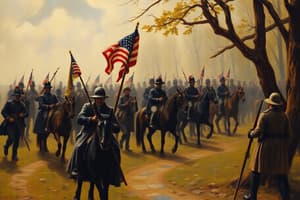Podcast
Questions and Answers
Who was the first President of the Confederate States of America?
Who was the first President of the Confederate States of America?
Lincoln's promise was to eliminate slavery in the South.
Lincoln's promise was to eliminate slavery in the South.
False
Which state was the first to secede from the Union?
Which state was the first to secede from the Union?
South Carolina
The Confederate States of America were formed on February 4, 1861, in __________, Alabama.
The Confederate States of America were formed on February 4, 1861, in __________, Alabama.
Signup and view all the answers
Match the following events with their corresponding dates:
Match the following events with their corresponding dates:
Signup and view all the answers
What was the primary concern of Republicans regarding the reintroduction of slavery in territories?
What was the primary concern of Republicans regarding the reintroduction of slavery in territories?
Signup and view all the answers
The Lecompton Constitution was backed by President Buchanan to satisfy his northern supporters.
The Lecompton Constitution was backed by President Buchanan to satisfy his northern supporters.
Signup and view all the answers
Who portrayed Abraham Lincoln as a radical abolitionist during the Lincoln-Douglas Debates?
Who portrayed Abraham Lincoln as a radical abolitionist during the Lincoln-Douglas Debates?
Signup and view all the answers
John Brown's raid on Harpers Ferry aimed to start a _______ rebellion.
John Brown's raid on Harpers Ferry aimed to start a _______ rebellion.
Signup and view all the answers
Match the following events with their related outcomes:
Match the following events with their related outcomes:
Signup and view all the answers
What was the outcome of the vote on the Lecompton Constitution in Kansas?
What was the outcome of the vote on the Lecompton Constitution in Kansas?
Signup and view all the answers
The election of 1860 resulted in a united Democratic party supporting a single candidate.
The election of 1860 resulted in a united Democratic party supporting a single candidate.
Signup and view all the answers
What happened to John Brown after the raid on Harpers Ferry?
What happened to John Brown after the raid on Harpers Ferry?
Signup and view all the answers
Which event allowed for the possibility of slavery in all U.S. territories?
Which event allowed for the possibility of slavery in all U.S. territories?
Signup and view all the answers
James Buchanan was strongly connected to the Kansas-Nebraska Act.
James Buchanan was strongly connected to the Kansas-Nebraska Act.
Signup and view all the answers
What was the main significance of 'Bleeding Kansas'?
What was the main significance of 'Bleeding Kansas'?
Signup and view all the answers
The __________ Act enforced the return of escaped slaves to their owners.
The __________ Act enforced the return of escaped slaves to their owners.
Signup and view all the answers
Match the following terms with their descriptions:
Match the following terms with their descriptions:
Signup and view all the answers
Which party nominated John C. Fremont in the Election of 1856?
Which party nominated John C. Fremont in the Election of 1856?
Signup and view all the answers
What was the ruling of the Dred Scott case regarding his claim to freedom?
What was the ruling of the Dred Scott case regarding his claim to freedom?
Signup and view all the answers
The Dred Scott Decision was favorably received in the North.
The Dred Scott Decision was favorably received in the North.
Signup and view all the answers
Study Notes
Crisis of the Union (1850s)
- The 1850s was a decade of significant political and social tension leading to the Civil War.
- Key events included the Compromise of 1850, the Fugitive Slave Act, and the publication of Uncle Tom's Cabin.
- The Kansas-Nebraska Act further inflamed sectional tensions, resulting in "Bleeding Kansas."
Election of 1856
- James Buchanan was the Democratic nominee, while John C. Frémont represented the Republicans.
- Buchanan won, but the election revealed growing Republican strength in the North.
Dred Scott Decision (1857)
- Dred Scott sued for his freedom, arguing that his residence in free territories made him free.
- The Supreme Court ruled against Scott, stating slaves were not citizens and Congress could not prohibit slavery in the territories.
- This decision further divided the nation and weakened the concept of popular sovereignty.
More Trouble in Kansas
- The Lecompton Constitution (attempt to bring Kansas in as a slave state) was rejected.
- This resulted in a further split and tensions within the Democratic party.
Lincoln-Douglas Debates (1858)
- Lincoln challenged Stephen Douglas in a series of debates.
- The main issue was the spread of slavery to the territories
- The debates solidified Lincoln's national reputation, making him a prominent Republican figure.
John Brown's Raid (1859)
- John Brown's raid on Harpers Ferry to instigate a slave rebellion failed.
- This event further heightened tensions between North and South, with the South fearing slave uprisings.
Election of 1860
- Lincoln won the election as the Republican candidate.
- This triggered secession, as Southern states believed Lincoln's election posed a threat to their way of life and slavery.
Secession
- South Carolina seceded from the Union in December, 1860, followed by other Southern states.
- The Confederate States of America was formed.
- The firing on Fort Sumter in April 1861 marked the beginning of the American Civil War.
Studying That Suits You
Use AI to generate personalized quizzes and flashcards to suit your learning preferences.
Related Documents
Description
Explore the events leading up to the Civil War, focusing on the key political and social tensions of the 1850s. This includes the Compromise of 1850, the Kansas-Nebraska Act, and critical Supreme Court decisions such as Dred Scott. This quiz challenges your understanding of this tumultuous period in American history.




